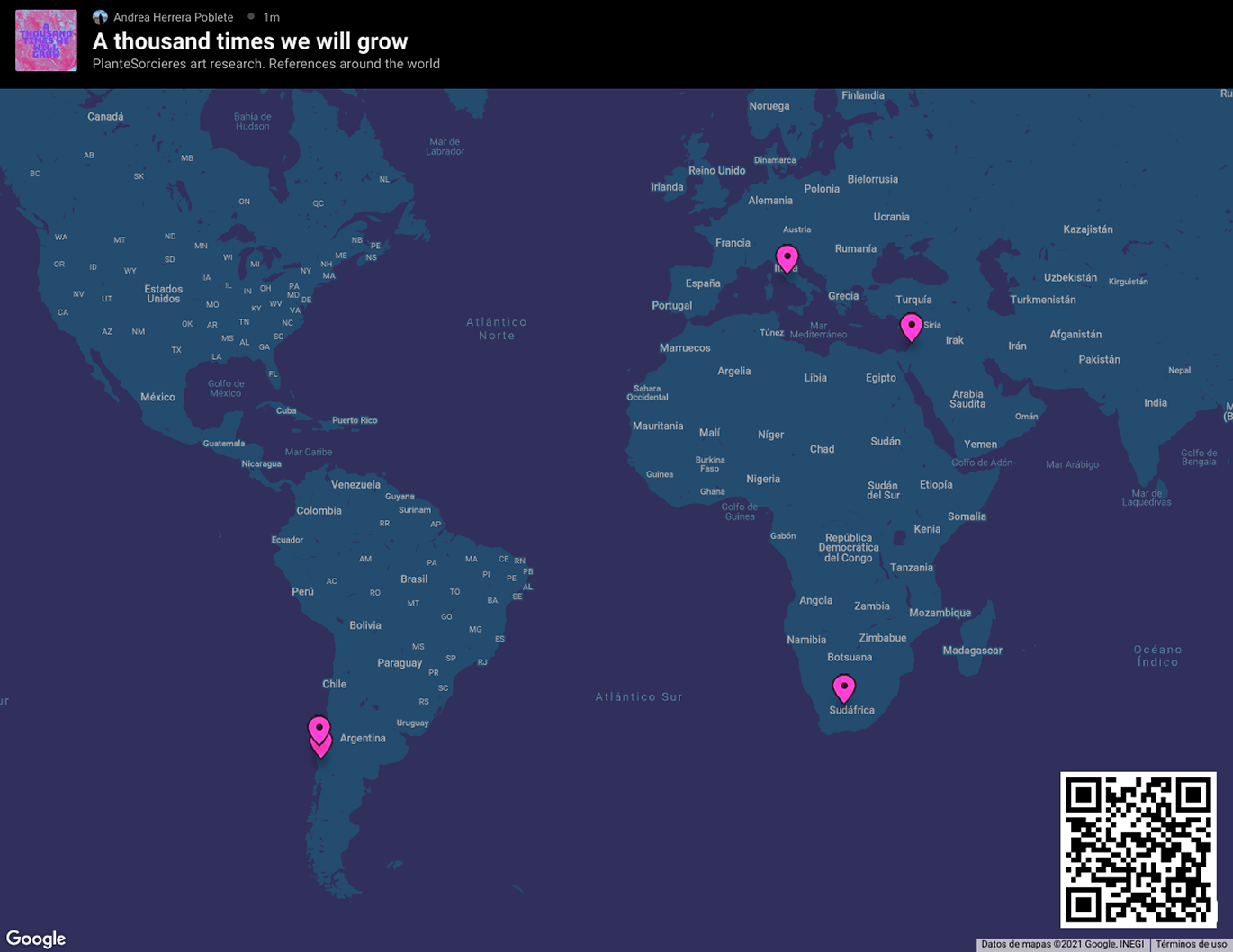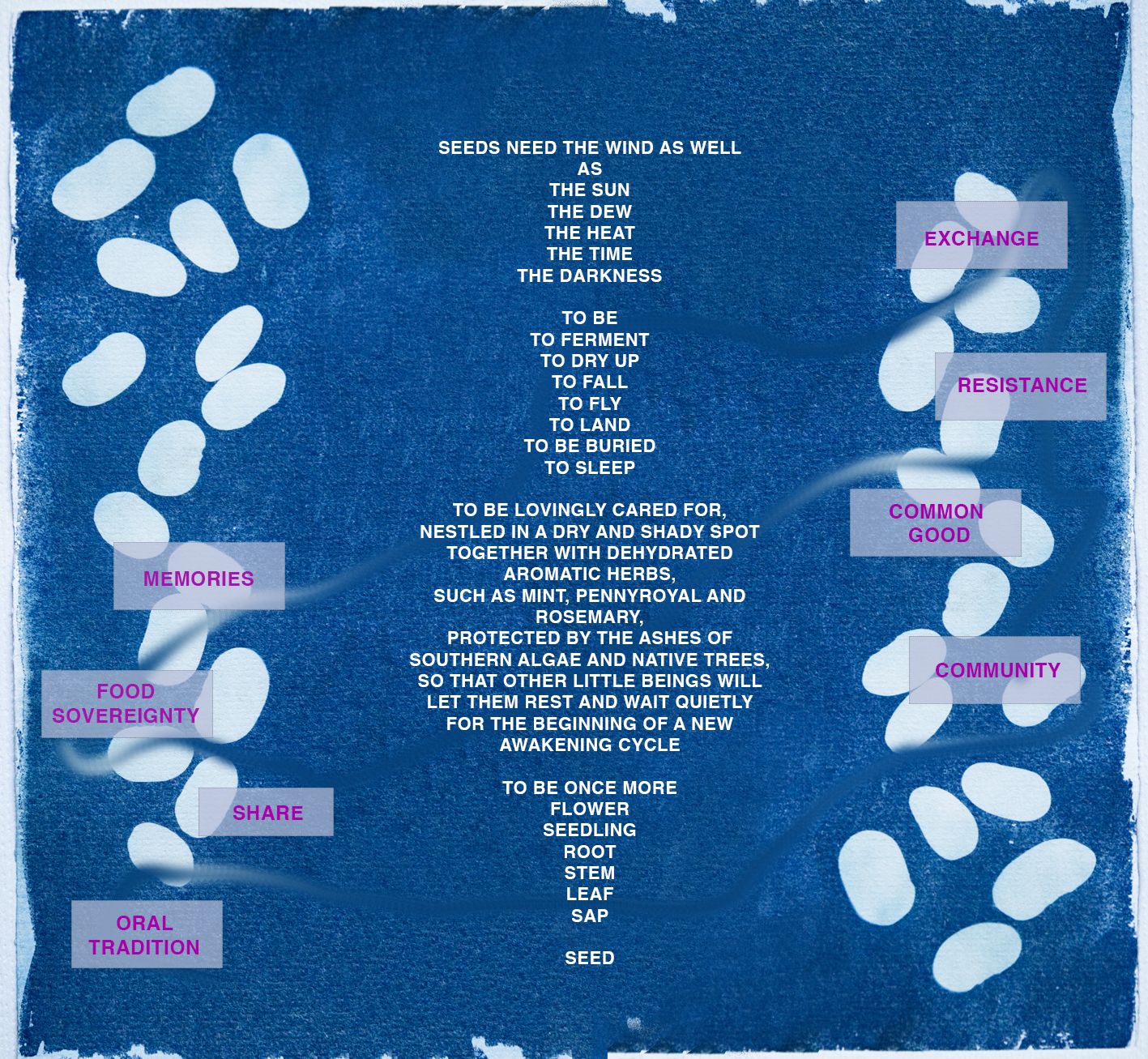- seeds in conversation
Plant Sorcierès
Moving around the globe and starting dialogues with people who belong to different territories and communities, “A thousand times we will grow” investigates how practices of collecting, storing, sharing and archiving seeds become a strategy to resist. In the past forty years, diverse groups of people started to collect and share biogenetic material in form of seeds as a way of counteracting and resisting the increasing control exercised by multinational corporations that, supported by governments, the Food and Agriculture Organization (FAO) and the World Bank, introduced new genetically modified and patented seeds in the market. The purpose of those groups was also to support their communities by making healthy food available; and to preserve, together with the biogenetic material, their stories and traditions.
The artistic and research project has started with the aim of exploring those practices and the different contexts in which they have been/are developed, as well as, learning from them and creating a network of communication and dialogue.
Themes: Share, Care, Commoning, Self-organising, Collectivity, Cohabitation, Matter
Ways of working: Translation, Conversation, Trusting, Artistic Practice
Methods: Oral Tradition, Trusting, Research, Artistic Practice, Discussion, Conversation
Seed banks are banks in the sense of places of collection, protection, and exchange of seeds, but they are also archives. The local or territorial ones not only contain biological and genetic information and organic DNA, but they also contain stories, narratives, and imaginary tools, so to be considered as affective memory containers.
The genetic material present in them is intertwined and embedded with the stories of the plants to which it belongs, and with the stories of the people and communities who created the collection and who take care of it. Seed banks are tools to preserve life and biological variety and to fight for food safety and food sovereignty. They can become spaces of resistance to capitalist transgenic biotechnologies.
We are living in a world in which, for many years, multinational corporations around the globe are working to make the possibility of patenting seeds legal, often supported by governments that believe more in increasing their economic return and power than in protecting and maintaining what should be considered a common good.
Starting in late 1940, research programs were promoted for genetic “improvement” aimed at the production of modern varieties of the ‘Green Revolution’ known as hybrid seeds. Between the end of that period and the late 1980s, the Food and Agriculture Organization (FAO) and the World Bank pushed for the approval of seed laws and certification standards, originating in the United States and later in Europe, to impose the modernized varieties.
Approving these laws, only seeds that meet the standards required therein can be marketed, and only from those holding a license. Moreover, often these seeds are made infertile, and thus forcing farmers to buy new seeds every year. This would lead to the loss of biogenetic material as well as an important part of history including stories, traditions and cultures, as well as the impossibility for many people to grow and consume healthy food.
For these reasons, groups of people around the world have organized themselves to create spaces to save not only their own lives, and thoseof future generations but also their cultures, wisdoms and traditions. The threat on the biogenetic material coincides with the threat of losing the stories behind the seeds, compromising the cultures of which they are part.
This is a story about how activities like exchanging, sharing, gathering, preserving, maintaining, and caring can be activated as resistance practices, and how these practices are linked to creation and artistic research. “A thousand times we will grow” aimed to understand how, all over the world, self-managed granoteques and institutional seedbanks are organized to counteract the processes of destruction of biological variety and local traditions by multinationals. We believe that care can be considered a practice of resistance and a defence strategy and that these practices can develop through alliances with the plant world.
Our story started from the stories carried by the seeds, contained in special archives and brought by the people caring for them.

https://es.padlet.com/andreaherrerapoblete/wewillgrow
Encounters:
Encounter number one: Ñaña Raquel Marillanca.
Encounter number two: Zayaan Khan - Seed Biblioteek
Raquel Marillanca
Raquel Marillanca Loncopan is a Mapuche woman who lives and works in the Biobio region, in Chile. She is an intercultural educator, leader of the Manuel Marillanca community. She is also an integral member of active groups of women dedicated mainly to taking care, growing, sharing and preserving traditional seeds. The decision to take care of the seeds comes in response to the threat of the so-called Monsanto Law, which will allow multinational corporates, like Monsanto, to patent native seeds, and fining small farmers that will sell those patented seeds. It comes also especially because of the growing need to source and eat healthy food in the community and
in the schools. The only effective way of getting it is to grow it. But the advancement of packaged and processed food has been followed by the appearance of genetically modified seeds on the market, which made the decision of gathering and collecting seeds even more important and urgent, and the need of knowing their exact story concrete.

Seed biblioteek - Zayaan Khan
Seed Biblioteek is a long-term project that was started by the artist Zayaan Khan in Cape Town, South Africa.
The project began when a central area of the city was threatened with eviction, having been abandoned for several years and occupied by local people who had begun not only to inhabit the disused buildings but also to cultivate the land. To resist the eviction, people around that area decided to organize a big market, to prove that the area was being used by the community.
On this occasion, the artist Zayaan Khan, in collaboration with other people, deci-
ded to open a pop-up seed library, inviting people around the area to share seeds, knowledge and stories. This decision came in response to the need of recovering the knowledge and culture of indigenous seeds that had been partly lost due to the colonialist story of the country, which, also through genocide and apartheid, has led to the loss of much traditional knowledge, as well as the effective replacement of many of the seeds commonly used by local populations with foreign seeds that were imported from abroad and, often, genetically modified.
It came as an attempt to respond to the question: How can we revive a culture, restoring the knowledge around seeds?
Seedbiblioteek became a space for sharing stories, to learn, to teach, for making community, and on a social level, seeds became understood as a form of memory. Stories were at the centre, considered much more important to tell and exchange than the colonial way of archiving biogenetical material.

How to store seeds
Stored seeds are susceptible to degradation due to humidity, microbial action, insects, excessive heat and solar radiation. Therefore, it is recommended to store them in a dry place, away from sunlight and at moderate temperatures.
One of the most common ways to store seeds is to place them under ashes, it will prevent both rot and insect predation, especially in humid climates where seeds are prone to fungi.
The best ash for storing seeds is characterized by a medium degree of acidity. In the South American countries, for example in the south of Chile, the most used plants for this are Radal (Lomatia Hirsuta), Lingue (Persea Lingue) and Hualle (Nothofagus Obliqua).
In Europe, the plant mainly used for this purpose is Ash Wood (Fraxinus). In the lands of southern Africa, close to the ocean, algae are used for the same purpose.
Another method to store seeds is using dehydrated aromatic and medicinal plants, like, for example, mint, rosemary and tobacco, whose smell will prevent insects from coming and damaging the seeds.

https://drive.google.com/drive/folders/1x3lYqz7ykt6Zw7hvCtWb7WuQT44g82m-
Mental Poe-Map: Diagram of concepts related to the care of seeds, based on a cyanotype of bean seeds, which were cultivated in the central zone of Chile, coming from the south of this country. Includes a poem inspired by the virtual meeting “Seeds in Conversation” with Raquel Marillanca (CL) and Zayaan Khan (ZA).
Video “Seeds in resistance /Coriander”: https://www.youtube.com/watch?v=MHDEK91V50E&t=24s
Audiovisual piece created in 2021 that poetically shares Ñaña Raquel Marillanca’s knowledge to sow coriander.
Video Talk “Seed in conversation”: https://www.youtube.com/watch?v=FQos0K3azGw&t=559s
Video talk/meeting between PlanteSorcières, SeedBiblioteek and Raquel Marillanca, with the participation of nicole Ibaceta (translation) and Sara Cattin (technical support)
Bibliography
The Unseen as Fertile Ground for New Wisdom - by Vivien Sansour
https://thisismold.com/space/farm-systems/the-unseen-as-fertile-ground-for-new-wisdom?fbclid=IwAR1aXJn3ekf5RYjz8E0jMKaolM1b8j2KdDyUctC-IN8gYnGlGbazMvWxjcs#zb-n
To say goodbye is to die a little - by Vivien Sansour
https://sustainablefoodtrust.org/articles/to-say-goodbye-is-to-die-a-little-palestinian-farmers-struggle-forsurvival/
Manifesto for Maintenance Art - by Mierle Laderman Ukeles
El Libro Familiar de Cuidadores de Semillas - by Rosemary Morrow and Susan Girard
Ch’ixinakax utxiwa. Una reflexión sobre prácticas y discursos descolonizadores - by Silvia Rivera Cusicanqui
Reading Amílcar Cabral’s Agronomy of Liberation - by Filipa César
https://monoskop.org/images/d/dd/Cesar_Filipa_2018_Meteorisations_Reading_Amilcar_Cabrals_Agronomy_of_Liberation.pdf
More than Soil, Seeds and Water
https://sustainablefoodtrust.org/wp-content/uploads/2013/04/More-than-Soil-Seeds-and-Water-True-Cost-Accounting-and-an-Intersectional-Sustainability-Index-for-Gender-and-Racial-Justice.pdf
Sow peasant feminism and you will reap Liberty - by Natalia Tangona
https://rosalux-ba.org/en/2020/08/11/sow-peasant-feminism-and-you-will-reap-liberty/
De la Puebla a la Mesa: al resguardo del patrimonio agroalimentario y la protección de la biodiversidad en tiempos de pandemia. https://www.cetsur.org/biblioteca-2/
The Parable of the Sower - by Octavia Butler
“Somos tierra, semilla, rebeldía”, by Claudia Korolhttps://porlatierra.org/novedades/post/164
Cuadernos Biodiversidad para defender nuestras semillas by Biodiversidadla
https://rosalux-ba.org/2021/04/15/cuadernos-biodiversidad-para-defender-nuestras-semillas/
Bayer construye en Chile la mayor fábrica de semillas de América Latina
https://www.dw.com/es/bayer-construye-en-chile-la-mayor-f%C3%A1brica-de-semillas-de-am%C3%A9rica-latina/a-48941345
“Ají pa tu caldo. Relatos desde la cocina de Kurarewe” Revista culinaria Mapuche Pewenche de Kurarrewe. 2019
Calendario Biodinámico de siembra 2021 by Agroecologiar
Botánica Oculta. Las plantas mágicas by Paracelso
Story of Seeds - by Vandana Shiva
Semillas de Vida - by Vandana Shiva
https://www.revistadelauniversidad.mx/articles/113c2d9e-1e17-440c-a4f7-c061e237dfd7/semilla-a-semilla
Entrevista a Miriam Nobre
https://www.sof.org.br/los-comunes-como-practica-tradicional-resistencia-en-el-presente-y-estrategia-hacia-al-futuro-desde-el-feminismo-nos-permite-otras-miradas-hacia-la-enorme-cantidad-de-tiempo-energia-y-conocimiento/
MOLD Issue 05: SEEDS
La revolución reflexiva by Humberto Maturana & Ximena Dávila. 2021
Alimentos, plantas, árboles curativos, mágicos, nativos, foráneos. Editorial Crisol. Witrän Propagaciones. 2014
Guía para semilleras y semilleros by Red de semilleros campesinos. 2016
Reencantar el mundo. El feminismo y las política de los comunes by Silvia Federici. 2020
FILMOGRAPHY:
The people who tried to save the world - by Dünyayı Kurtarmaya Çalışanlar (short documentary) TURKEY
https://vimeo.com/44651102 video interview of Patricia Chavarría (Museo Violeta Parra) https://www.youtube.com/watch?v=bsIGzeGCflY
Archivo Cultura Tradicional https://www.artistasdelacero.cl/archivo/
Sowing seeds for the future - by Dominique Koch
The seeds of Vandana Shiva - by Camilla and Jim Beckethttps://vandanashivamovie.com/
EVENTS:
Workshop_66/LIBERA SCUOLA DEL GIARDINO Arte & Nutrimento ad Arte - PAV, Torino - 3 Luglio 2021.
Guardianas de Semillas, online workshop organizado por Sembrares. 2021 - 2022https://www.sembrares.com/guardianas-de-semillas
ARTISTS:
Natalia Montoya Lecaros
https://colectivainternacionalista.hotglue.me/?natalia+montoya
Vivien Sansourhttps://viviensansour.com/
Jocelyn Rodríguez Droguetthttps://jrdroguett.cl/
Marco Ranieri
http://marcoranieri.org/about-Marco-Ranieri
Zayaan Khan
PROJECTS:
The Sustainable Food Trust https://sustainablefoodtrust.org/contributors/vivien-sansour/
Palestine Heirloom Seeds Libraryhttps://viviensansour.com/Palestine-Heirloom
Biodiverso
https://biodiversitapuglia.it/il-progetto-biodiverso/
La Compagnia del Carosellohttps://lacompagniadelcarosello.it/
SeedBiblioteek
https://www.facebook.com/seedbiblioteek
La Grainotheque - Sierrehttps://www.bmsierre.ch/grainotheque/
Cetsur - Agroculturashttps://www.cetsur.org/
Thanks to: Nicole Ibaceta, Zayaan Khan, Raquel Marillanca, SoC, Sara Cattin, Anca , Arturo
To all our friends who are with us no matter the distance & Nina
How do we act towards a post-human idea and practice of commoning?
For us it’s to imagine the tangible and intangible universe of what surrounds us in the form of invisible threads that carry sensitive stories and allow us to embark on journeys to connect with the knowledge accumulated by humanity. This results in new ways of relating to the universe of the living, in our case, with medicinal plants, seeds and caring led by women from different territories. For us, it’s to believe in the capacity that we have to observe, marvel and, above all, learn from these relationships that the natural world gives us, and that are there to expand our ways of understanding and inhabiting this planet, away from the notion of supremacy strongly installed by the capitalist patriarchy.
Caterina Giansiracusa
Artist.
Andrea Herrera Poblete
Artist.